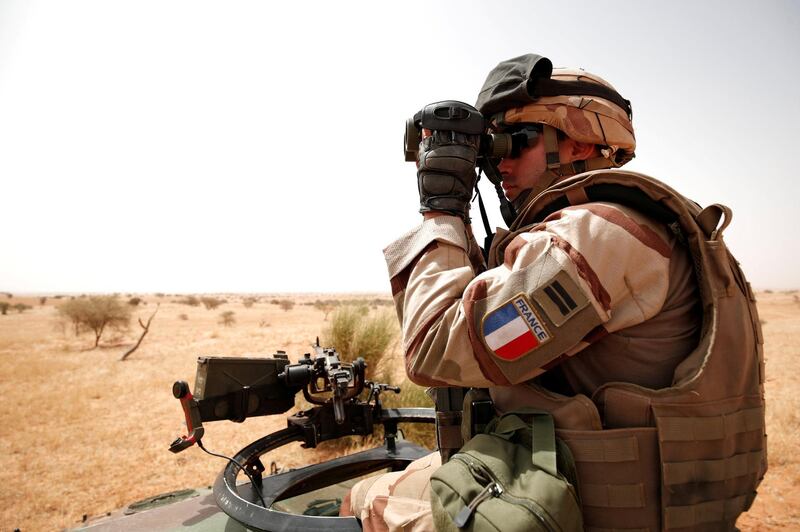Yahya Abu Hammam was not well-known outside counter-terrorism circles. The former deputy head of Al Qaeda's affiliate in the Maghreb, also known as Djamel Okacha, he played a pivotal role in bringing an amorphous body of militant groups across multiple countries under the banner of Al Qaeda.
Last year he was one of a handful of militant leaders who pledged allegiance to Al Qaeda's leader Ayman Al Zawahiri, under the new banner of Jamaat Nusrat Al Islam wal-Muslimeen, or Al Qaeda in the Islamic Maghreb (AQIM). It would be one of his last major acts as a militant: last weekend, he was reportedly killed by French troops in an operation in Mali.
His killing briefly brought to the fore a war that has mainly been fought in the shadows, away from the media attention of ISIS in Syria or the Libyan civil conflict, even though both have had an impact on the situation in the Sahel.
But it also shines a light on France's murky role in a conflict taking place across an area larger than western Europe. Operation Barkhane is now in its fifth year; a politically and militarily complex war – and one that has pushed France back into some of its old colonial habits.
The Sahel is a vast semi-arid region bordering the Sahara, passing across the entire African continent.
France’s operations in the Sahel started in 2013, as local militias and the fallout of the Arab uprisings in Libya allowed Al Qaeda a foothold in the deserts of northern Mali. Instability and violence have plagued five Sahel countries: Burkina Faso, Chad, Mali, Mauritania and Niger, and French troops work alongside a separate G5 Sahel counter-terrorism force to disrupt and destroy these insurgencies.
Yet the problems in the region are not straightforward, nor solely involve Al Qaeda. The underlying causes of the violence are complex and take root in the changing societies and harsh economics of the region, all of which Al Qaeda and a myriad other insurgent groups have exploited.
Although the spark for this latest round of insurgencies was the collapse of the Libyan state, the countries of the Sahel region have been under immense stress for much longer. By 2012, every single one of the G5 countries had declared a food emergency. Two years before that, in 2010 – prior to the Arab uprisings – a severe drought provoked a food crisis across the region that affected at least 10 million people.
In such an environment of food insecurity, rising prices, loss of agricultural land, the widespread death of cattle – and even, in many places, death from starvation – it is no surprise that political tensions have increased. And it is a widespread problem: the areas of Nigeria most affected by the militant group Boko Haram are also those worst affected by drought and food shortage.
At the same time, there has been a reordering of militant groups in the region, as the creation of a new Al Qaeda umbrella group last year demonstrates, because of multiple pressure points: Sahel governments have targeted these groups with western weapons, creating a tendency to lump all government opponents into the “counter-terrorism” camp.
As the base of ISIS operations in Syria and Iraq has shrunk, that group, and others, have sought other territories to operate from. As happened in Syria, there has been – and continues to be – something of an intra-militant civil war, with groups battling each other for resources, recruits, funding and fighters.
Small wonder, then, that France, the primary western power in the region, finds itself backing an array of different groups and aiding questionable policies. France has intervened in every one of the five G5 countries, from stopping Islamist militants from overrunning the Malian capital, to sending warplanes this month against a group of rebels who were threatening the Chadian president Idriss Deby.
It was that operation in particular that raised the criticism that France had gone back to its old habits, propping up the African strongmen it prefers.
Because Paris, far from being a well-intentioned outsider caught up in the region's complex violence, has been actively involved in the countries of the Sahel for more than a century. During the colonial era, it ruled every one of the G5 countries and has remained heavily involved in their political life since.
When, in 2014, a popular uprising ended the 27-year rule of Burkina Faso's president Blaise Compaore, it was the French military, controversially, that helped him flee the country.
That same year, France finally ended its 28-year Operation Epervier in Chad, only to promptly replace it by Operation Barkhane, now with a new justification – counter-terrorism – for French troops to operate across the region. This new operation and new justification will see France expand or create military bases in every one of the G5 Sahel countries.
These sorts of interventions and deployments aggrieve many Africans, who want the era of "Francafrique" –a word used to describe France's long history of political and military interference in its former African colonies – relegated to history. France's president Emmanuel Macron has claimed this is already the case.
But a complex war in a region France used to rule has tempted the worst instincts of Paris's politicians, adding another layer and more military boots to an already combustible war in a risky region – a layer that the region's millions of citizens certainly don't need.





